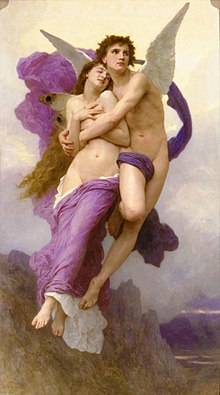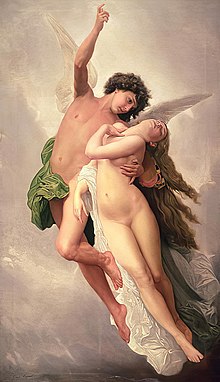Psyche (mythology)
This article needs additional citations for verification. (April 2020) |
| Psyche | |
|---|---|
Goddess of the soul | |
 The Abduction of Psyche by William-Adolphe Bouguereau (1895) | |
| Symbol | Butterfly wings |
| Personal information | |
| Parents | Unnamed King and Queen[1] |
| Siblings | Two unnamed sisters |
| Consort | Eros |
| Children | Hedone |
Psyche (/ˈsaɪkiː/;[2] Greek: Ψυχή, romanized: Psukhḗ) is the Greek goddess of the soul. She was born a mortal woman, with beauty that rivaled Aphrodite. Psyche is known from the story called The Golden Ass, written by Lucius Apuleius in the 2nd century. See Cupid and Psyche.

Mythology[]
Early life[]
Psyche was the youngest daughter of a Greek king and queen. She had two elder sisters. She was the fairest among her siblings and she looked like a goddess among mortals. She was so beautiful that people, including priests, compared her to Aphrodite, the Greek goddess of love and beauty. Many went to the extent of saying that she was even fairer than the goddess. When Aphrodite's temples were deserted because people started worshiping Psyche, the goddess was outraged. As a punishment, she sent her son, Eros, to make Psyche fall in love with a vile and hideous person. However, Eros fell in love when he saw her and decided to spare her from his mother's wrath.
Both of her elder sisters were jealous of her beauty. Her sisters eventually got married to kings and left to be with their husbands. Nobody asked Psyche's hand for marriage; men would rather admire her beauty. She was left alone. Desperate, her father decided to consult the oracle of Delphi to get answers.
Marriage to Eros[]
This section may need to be rewritten to comply with Wikipedia's quality standards, as incomplete information and lack of encyclopedic tone. (February 2021) |
Her father, the king, consulted the Oracle of Delphi, seeking a solution. From inside the priestess, Apollo himself spoke. He said, "Despair, king. Your daughter will marry a beast even the gods fear. Dress her in funeral clothes and take her to the tallest rock spire in the kingdom. There, she shall meet her doom." The king was heartbroken, but obeyed the orders from Apollo.
He took her in funeral clothes to the tallest rock spire in the kingdom. Psyche waited for the beast, but when it did not come, she jumped from the spire. The kingdom presumed her to have perished.
But Zephyrus, the Greek lord of west wind, had saved her from death. He had taken her to Eros's palace where she waited until night for Eros to return. There, she saw that the palace was very large and each cupboard was filled with gold. When Eros returned, he said to Psyche in utter darkness that she must not see him. She must not try to see him and he can't tell her his name or it would ruin everything. The first few weeks of Psyche's life in the palace were great, but soon she heard her sisters calling out her name. Her two sisters convinced her to see her husband's true form, in case he was tricking her.

Psyche eventually listened to what they told her. She sneaked into her husband's room with an oil lamp and a knife. Psyche shone the light on her husband's face, and a small drop of hot oil fell onto his shoulder, awakening him and burning him. Betrayed by his wife's actions, Eros ran off to his mother, Aphrodite. After learning what she had done, Psyche was miserable and depressed. Aphrodite found Psyche and made her face four trials. [3]The first trial was to sort a huge mount of seeds. With the help of an empathetic ant colony, Psyche completed this task. Her next task was to gather wool from a notoriously dangerous sheep. Psyche was saddened but helped by a river god, who taught her to collect pieces of wool from bushes. Her next task was to collect water from the underworld. Psyche was now assisted by the eagle of Zeus, who collected the water for her. Psyche's last task was the most difficult; she had to bring back some of Persephone's beauty for Aphrodite. Persephone willingly gave Psyche some of her beauty. When she was near Olympus, Psyche opened the box of Persephone's beauty, but the only thing inside was the essence of death. Psyche died, but her husband, Eros, who had forgiven her, saved Psyche's life and took her to Olympus. Psyche was made the goddess of the soul. Psyche and Eros had a daughter, Hedone, goddess of physical joy.
See also[]
Notes[]
- ^ The following summary is condensed from the translation of Kenney (Cambridge University Press, 1990), and the revised translation of W. Adlington by S. Gaseless for the Loeb Classical Library (Harvard University Press, 1915), with reference to the accompanying Latin text.
- ^ Oxford dictionary
- ^ "The Myth of Cupid and Psyche". ThoughtCo. N.S. Gill. Retrieved April 2, 2021.
References[]
- Lucius Apuleius, The Golden Ass, translated from original Latin by Thomas Taylor, London, 1822. Read online at Internet Archive
Further reading[]
- Benson, Geoffrey C. "Cupid and Psyche and the Illumination of the Unseen." In Re-Wiring The Ancient Novel, 2 Volume Set: Volume 1: Greek Novels, Volume 2: Roman Novels and Other Important Texts, edited by Cueva Edmund, Harrison Stephen, Mason Hugh, Owens William, and Schwartz Saundra, 85-116. Luxembourg: Barkhuis, 2018. www.jstor.org/stable/j.ctvggx289.30.
- Dowden, Ken. "Psyche on the Rock." Latomus 41, no. 2 (1982): 336-52. www.jstor.org/stable/41532497.
- Edwards, Lee R. "The Labors of Psyche: Toward a Theory of Female Heroism." Critical Inquiry 6, no. 1 (1979): 33-49. www.jstor.org/stable/1343084.
- GAGNÉ, LAURIE BRANDS. "Inanna, Demeter, and Psyche." In The Uses of Darkness: Women's Underworld Journeys, Ancient and Modern, 23-62. Notre Dame, Indiana: University of Notre Dame Press, 2000. www.jstor.org/stable/j.ctvpj7c20.5.
- Haskins, Susan L. "A Gendered Reading for the Character of Psyche in Apuleius' "Metamorphoses"." Mnemosyne, Fourth Series, 67, no. 2 (2014): 247-69. www.jstor.org/stable/24521701.
- Katz, Phyllis B. "THE MYTH OF PSYCHE: A DEFINITION OF THE NATURE OF THE FEMININE?" Arethusa 9, no. 1 (1976): 111-18. www.jstor.org/stable/26307539.
- MAKOWSKI, JOHN F. "PERSEPHONE, PSYCHE, AND THE MOTHER-MAIDEN ARCHETYPE." The Classical Outlook 62, no. 3 (1985): 73-78. www.jstor.org/stable/43934919.
- McCreight, Thomas. "Psyche’s Sisters as Medicae?: Allusions to Medicine in Cupid and Psyche." In Lectiones Scrupulosae: Essays on the Text and Interpretation of Apuleius' Metamorphoses in Honour of Maaike Zimmerman, edited by Keulen W.H., Nauta R.R., and Panayotakis S., 123-67. Barkhuis, 2006. www.jstor.org/stable/j.ctt13wwxg3.14.
- Cupid and Psyche
- Characters in Greek mythology
- Roman mythology
- Psyche